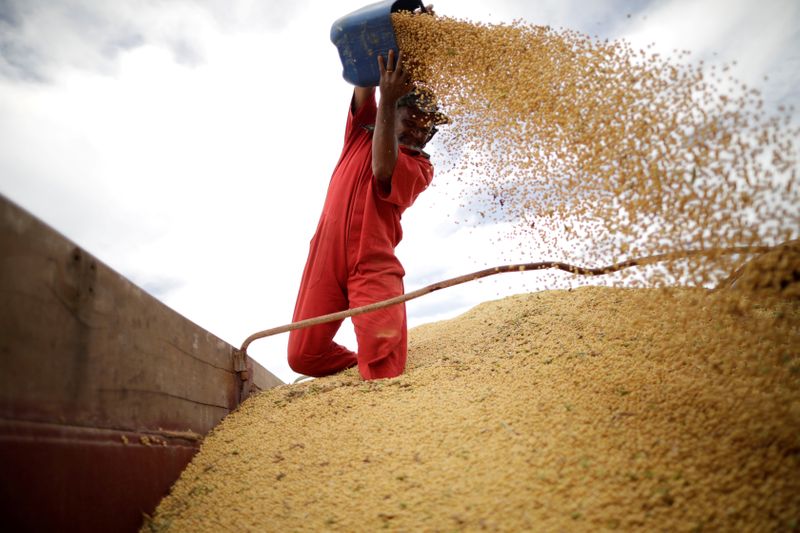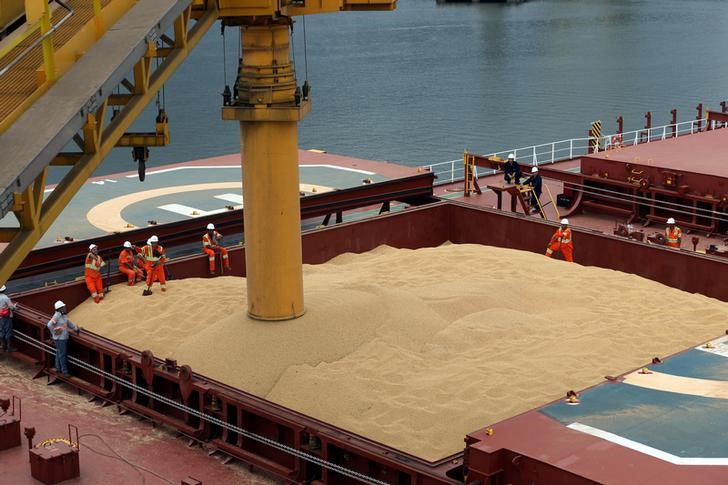By Ana Mano and Mark Weinraub
SAO PAULO/CHICAGO (Reuters) - U.S. farmers sold freshly harvested soybeans directly off their combines for a profit as prices rose to a four-year high this autumn, a welcome change from the losses suffered during the U.S.-China trade war.
Strong exports to China as the world's top soybean importer emerged from lockdown helped push the most-active soybean futures contract at the Chicago Board of Trade
But the unusual surge came too late for many Brazilian farmers, on the opposite southern hemisphere growing cycle, who had already committed to selling their crops at much lower prices and may now seek to renegotiate contracts with buyers.
Brazil ran out of the oilseed earlier than usual this year. It has sold so much to China that in recent weeks local companies had to import soybeans - a rare event for the world's top exporter. Those imports included 30,000 tonnes from the United States. That is a tiny amount by global trading standards but the most U.S. soy Brazil has purchased since 1997.
Brazil had been the primary beneficiary of the U.S.-China dispute started by U.S. President Donald Trump in 2018 as China relied on South America for almost all its soybean needs. But global market forces are finally helping U.S. farmers.
After signing a "Phase 1" trade agreement in January, China started ramping up U.S. soybean purchases in the second half of the year, helping spur the largest late summer soybean price rally in 13 years.
U.S. farmers who waited for the harvest to start in September before selling their crops rather than committing them early were rewarded handsomely with sales straight from the fields to processors and elevators.
"For once it was the right thing ... Usually the best opportunities to sell for fall are March through June but the world came to an end in March," said Norway Center, South Dakota, farmer Jed Olbertson, referring to the sharp decline of commodity prices as the COVID-19 pandemic hit the western hemisphere.
'PROBLEMS WILL OCCUR'
Brazilian farmers, who start harvesting in January, presold sold roughly half of their crop before August, according to grain group Aprosoja. The price differences expected at harvest evoke memories from the 2003/2004 season when they refused to deliver grains sold in advance.
Frederico Humberg, owner and chief executive of fast-growing trading house AgriBrasil, said that a majority of contracts have "no guarantee" that the grain will be delivered, as there is no pre-payment of the grains by buyers.
"If Chicago prices and the dollar continue to be at current levels, problems will occur," Humberg said. "Come time to collect the beans, farmers may allege yields fell or some kind of weather problem in a bid to improve the terms of the grain sale done in advance."
Buyers from two large U.S. companies with operations in Brazil, who spoke on condition of anonymity, said there is also a risk of non-delivery. Farmers presold their beans when the 60-kilogram bag was around 80 reais, they said, less than half of the 170 real ($31.26) current price level.
Soy prices in Brazil closely mirror Chicago, taking account local port premiums and freight prices. Soybean prices are holding around their highest in more than four years after the autumn rally, which was spurred by storms and dry weather in both the United States and Brazil, as well as strong exports.
Soy processing plants and meatpackers in Brazil, a top global meat supplier, face much higher costs for feed, fueling food inflation. The country even modified regulations on genetically modified soy to allow it to import additional soybeans from the United States.
Farmers will also face higher costs for imported seeds and fertilizer as Brazil's currency weakens against the dollar.
Brazilian farmers told Reuters they missed out on the rally, but noted selling part of their produce in advance is a classic way to lock in planting costs early on in the season.
"I am one of the most regretful farmers," said Cayron Giacomelli, a grower in Brazil's top grain state Mato Grosso. "Nobody imagined, even in the best-case scenario, that we would have prices above 120 reais per bag for future delivery at this time of the year."
U.S. farmers, who have also received record subsidies from the government this year, are meanwhile counting their blessings after years of over supply and low prices saw them take on increasing debt and forced many out of the industry.
"Maybe it (soy) was going to go some more, maybe it wasn't but I'm going to pay some bills," said Paul Anderson, a farmer from Coleharbor, North Dakota.

($1 = 5.4380 reais)
